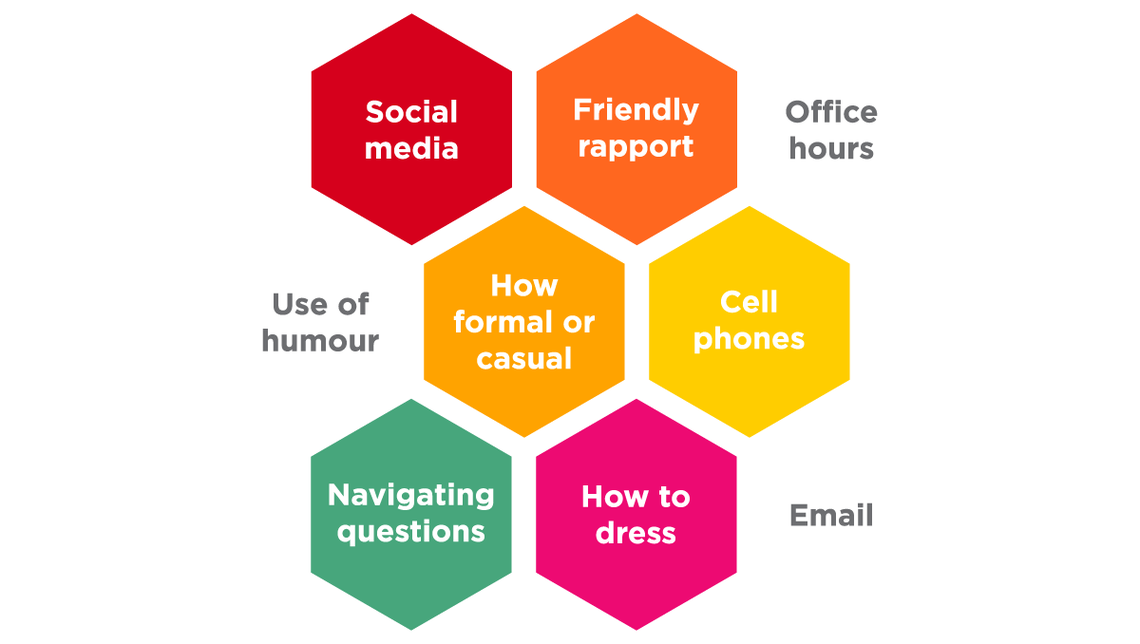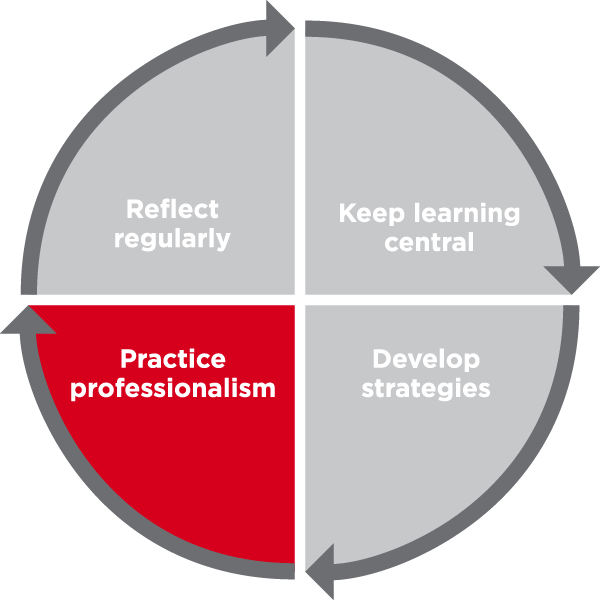
Lesson 5: Professionalism
Becoming a GAT is an opportunity to support student learning while also building your own professional practice as a teacher. Because you are still a student yourself, though, you might wonder about the professional norms and behaviours expected of teaching assistants. Take some time to thoughtfully review the following list then complete the activity below to reflect on what goals you can set for yourself this term.
Professional practices of teaching assistants
- Respect confidentiality of students
- Treat students with respect by respecting diverse cultures, perspectives, etc.
- Be fair, equitable, and refrain from favouritism
- Ensure discussion groups are inclusive
- Know how to support anti-racism at UCalgary
- Refer students to Student Support Advisors if you have concerns about student wellness and mental health
- Handle disagreements with the course instructor/professor in an ethical way
- Practice professional communication in person, in emails, etc.
- Respond to emails in a timely manner and keep copies of communication
- Be prepared for your duties as a TA, e.g., organized for labs, notes for teaching, etc.
- Be on time
- Respect students’ privacy
- Be where you say you are for office hours
- Embrace open door policies – do not leave doors closed when with students, but be sensitive to a voice carrying to the outside corridor
- Mark and grade with consistent and transparent standards adhering to academic integrity
- Be aware of ethics of behaviour outside of the classroom
- Give constructive criticism on sensitive matters professionally
- Show up to all lectures and take notes, if appropriate
Adapted from UVic Teaching Assistant’s Codes of Conduct
Activity
After reviewing the list of professional practices above, download the handout below and capture your thoughts in the spaces provided.

In addition to the above list, there are a number of questions you will want to think through as you establish your professional identity as a GAT. For many of these issues, it will be up to you to decide what works best for your situation. However, if you are not sure about department or instructor expectations, it is always better to ask ahead of time.
- What professional boundaries will you set around interacting with your students on social media?
- How will you establish friendly rapport with all of your students without hindering your professional presence?
- What norms do you want to set for your office hours whether in person or online: by appointment, drop in, individual, group, etc.? Will you take summary notes and send them to both the instructor and student?
- How can you ensure that your use of humour (including jokes, cartoons in slides, etc.) is appropriate and professional?
- How formal or casual do you want to be with your students? How would you prefer them to address you?
- How do you want to handle technology/cell phones during class time? Make sure you model what you expect of your students.
- How will you navigate questions about assignments, due dates, difficult topics, etc. so that all students have the same information?
- How do you want to present yourself by how you dress for class? In some fields, business attire is expected. In labs, appropriate safety rules must be followed. In other contexts, it may be completely your choice.
- How will you set and maintain friendly professionalism in your email communications with students? Again, modelling professional communication also helps students learn the norms of your field.
Additional resources
As a teaching assistant it can be tricky to know what your responsibilities are if you suspect or observe academic misconduct. This resource is intended as a suggested guideline about what to do in such situations in your role as a GAT. This resource may not cover all situations, but it can
serve as a starting point.
A one-page handout that identifies ways to recognize racism and promote academic integrity.
This documentation ensures that graduate students on campus are afforded fair treatment with regards to their time as teaching assistants on campus – their hours, their place and style of work, the workload they are asked to contend with, and the resources at their disposal.
Lesson checklist
- Review the professional practices of teaching assistants
- Reflect on the professional practices that are most important to you as a teaching assistant
- Consider which professional practice(s) you would like to enhance




